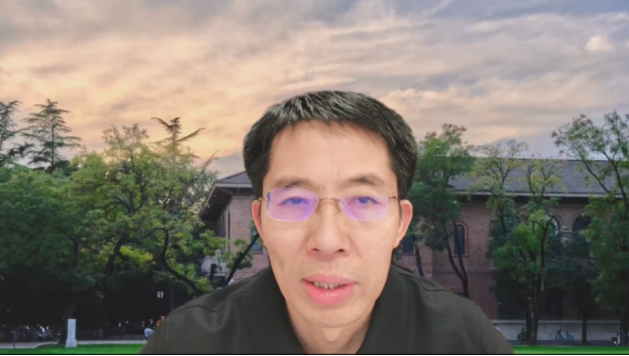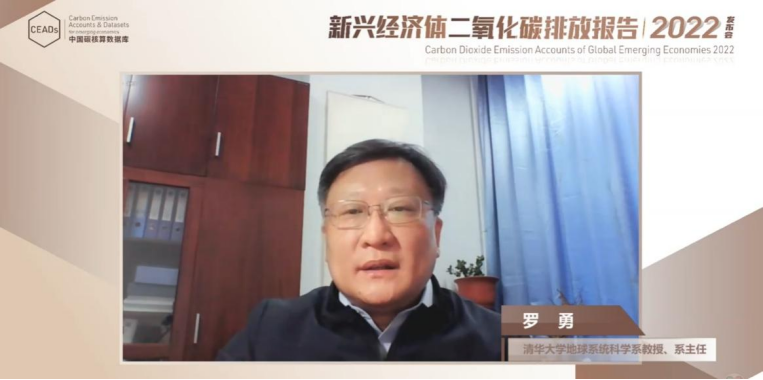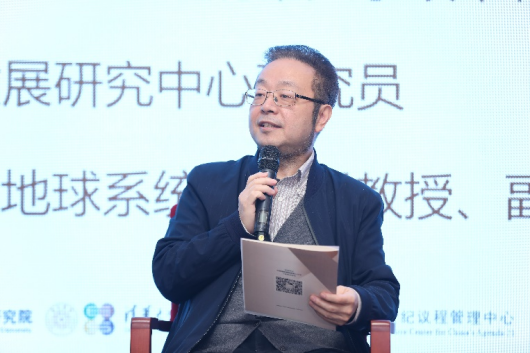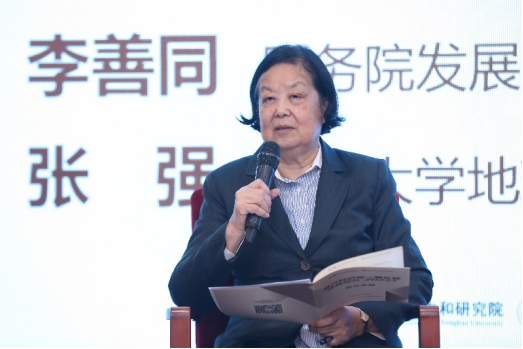Carbon dioxide emissions from fossil fuels (hereinafter referred to as "carbon emissions") are one of the main causes of global warming. In the past, governments and academic circles, while focusing attention on the big emitters with huge economies and population scales, ignored the carbon emissions of many small and medium-sized new economies. Recently, an international team spearheaded by Professor Guan Dabo of the Department of Earth System Science (DESS), Tsinghua University, has released the Annual Report 2022 for Carbon Dioxide Emission Accounts of Global Emerging Economies and the latest research results, proposing a new view of global climate change and emission reduction, namely, small and medium-sized emerging emission economies (hereinafter referred to as "emerging emission economies") will be the significant contributors to global carbon dioxide emissions in the future, and developed countries should make room of carbon emissions for their future development.
On the morning of October 25, the Launch Conference of Annual Report 2022 for Carbon Dioxide Emission Accounts of Global Emerging Economies was held in Beijing. Vice President Rong Zeng of Tsinghua University, Academician He Kebin of the Chinese Academy of Engineering, who is also President of Tsinghua University Institute for Carbon Neutrality, and Dean Luo Yong of the DESS, Tsinghua University attended and addressed the conference.

Rong Zeng delivers a video address
In his address, Rong Zeng noted that climate change is one of the major global challenges facing mankind. In the Party's Report to the 20th CPC National Congress, President Xi Jinping pointed out that it is necessary to actively and steadily promote carbon peaking and carbon neutrality, speed up the planning and construction of new energy systems, and actively participate in global governance in response to climate change. Carbon Emission Accounts and Datasets for Emerging Economies (CEADs) led by Professor Guan Bo is committed to building a multi-scale carbon emission inventory database in China and around the world. It is hoped that CEADs will bravely break the boundaries and barriers of disciplines and realize the integration of different knowledge systems, providing strong scientific support for developing countries to clarify the current situation of carbon emissions and scientifically design carbon emission reduction paths.

Luo Yong delivers a video address
In his address, Luo Yong noted that given the new pattern of global climate governance, carbon dioxide emission accounting has become the basis for accurately grasping the future emission trends, effectively carrying out various emission reduction work, promoting the green transformation of the economy and society, and strengthening international cooperation in handling climate change. The series of Report for Carbon Dioxide Emission Accounts of Global Emerging Economies published since last year can provide detailed and continuous data reference for low-carbon development plans of emerging economies, and offer support for the realization of global climate change mitigation goals, especially for South-South Cooperation in the field of climate action, so as to strengthen the voice of emerging economies in global emission reduction actions.
At the Launch Conference, Guan Dabo interpreted the Annual Report 2022 for Carbon Dioxide Emission Accounts of Global Emerging Economies. He noted that given the new pattern of global climate governance, carbon emission accounting has become a basis for accurately grasping the trend of emission changes and strengthening international cooperation in coping with climate change. Previously, emerging economies were generally faced with the problems of different accounting methods and imperfect scales of carbon dioxide emissions. Therefore, the team adopted the international authoritative accounting method to build a unified, transparent and scientific accounting system through "data crowdfunding", compiled the carbon dioxide emissions inventory of 50 emerging economies around the world, and made an in-depth introduction and analysis of emissions from the perspectives of energy and emission sector sources and regional distribution, revealing the carbon dioxide emissions characteristics of emerging economies.
Additionally, Guan Dabo also shared the latest research findings of the team based on the carbon emission inventory database of emerging economies. It is found that during 2010-2018, the annual emission growth of more than 50 emerging emission economies was higher than the global average. Although most economies' emissions were less than 1% of the total global emissions, their total emissions were 1.6 times that of India. The infrastructure construction driven by the future industrialization of these countries will lead to the continuous growth of carbon emissions, which undoubtedly poses a severe challenge to the goal of controlling the temperature rise within 1.5 degrees Celsius at the end of this century. Focusing on the question "who will reduce emissions under the temperature control target", the research team has found that if the global temperature control target of 1.5 degrees is to be achieved, and enough space for carbon emissions is to be reserved for the emerging emission economies, other countries need to reduce their carbon emissions by 7.2% every year. However, between 2010 and 2018, the average annual reduction rate of carbon emissions in the European Union and the United States was only 1.4% and 0.9% respectively. Therefore, it is imperative for developed countries, mainly in Europe and America, to reduce emissions. On the one hand, developed countries should provide economic and technical support to emerging emission economies. On the other hand, it is necessary for them to strengthen their own emission reduction targets, realize negative emissions as soon as possible, make room for emerging emission economies, and on this basis, establish the cornerstone of global climate change negotiations with "consensus and good faith" as the core.

He Kebin makes comments
The above research results, while providing scientific and technological support for the construction of a carbon emission data system in countries along the “Belt & Road”, also help to promote South-South Cooperation in the field of climate change, and help emerging economies to realize green and low-carbon transformation, play an active role in global governance, and jointly achieve the global net zero carbon goal.
He Kebin, in his comments, mentioned that the carbon accounting database adopted a unique form of "data crowdfunding", and through the construction of a complete, unified and comparable system, it downscaled the data of 50 countries and 47 industries to the regional level, which was of very high quality, playing a great role. He Kebin noted that from carbon reduction to pollution reduction, organizations such as CEADs are needed to cooperate with each other to fulfill the common but differentiated responsibilities for the global response to climate change and the achievement of the sustainable development goals (SDGs) of the United Nations, and let databases play a greater role.

Li Shantong makes comments
Li Shantong, a researcher at the State Council Development Center, said that it is particularly important and necessary to actively and steadily promote carbon peaking and carbon neutrality, especially to improve carbon emission accounting and actively participate in global governance in response to climate change. From the perspective of global development, emerging economies are also a focus of attention, so this work is forward-looking.
Academician Tao Shu of Peking University noted that Guan Dabo's research team focuses on emerging economies long neglected in the field of carbon emissions, establishes a historical carbon emissions database, and presents a scientific trend prediction of their future carbon emissions, deepening the interpretation of emission reduction to cope with global climate change. Tao believed that this work will inspire more attention to emission reduction in emerging emission economies, while revealing the important role that developed countries should play in dealing with global climate change, that is, they should not only respect the development rights of small and medium-sized developing countries, but also give them technical and financial assistance to reduce emissions, and they should also strive to achieve carbon emission reduction targets first.
In his concluding remarks, Guan Dabo noted that more developing economies will be added in future reports, and the concept of "sharing and joint construction" of China's carbon accounting database will be passed on in efforts to provide support and guarantee for future climate policy data of emerging economies or developing countries.
Written by Wang Jiayin